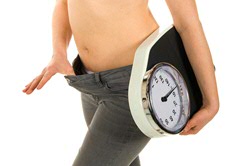Change of medication after stomach reduction
A medicine widely used for high blood pressure either works less well or is absorbed faster after a stomach reduction. The operation also appears to be effective in combating type 2 diabetes. This was discovered by Jan Peter Yska, hospital pharmacist at th e Leeuwarden Medical Centre.
Stomach reductions are a relief for many people who are seriously overweight. It has become clear that the treatment leads to substantial weight loss. Little was previously known, however, about the impact of the operation on the effectiveness and use of the medication that patients take after the operation. Yska will be awarded a PhD by the University of Groningen on 2 June 2017.
Around 12,000 severely obese people undergo a stomach reduction in the Netherlands every year. During this procedure, the surgeon reduces the size of the stomach and may also create a bypass to circumvent part of the intestines. As a result, the patient feels saturated sooner, while the digestion of food becomes less efficient, causing considerable weight loss.
Medical literature
‘It seems logical that such surgery might affect the absorption of medicines’, says Jan Peter Yska, hospital pharmacist at Leeuwarden Medical Centre (MCL). ‘Yet there was little to be found on the subject in the medical literature.’ He had studied the published research findings at the request of surgeons at Leeuwarden Medical Centre, who perform between 600 and 1,000 stomach reductions annually. ‘They were wondering whether any problems might arise regarding medicines.’
Metoprolol
Among other things, Yska investigated how the drug Metoprolol, used to combat high blood pressure and arrhythmia, was absorbed after a stomach reduction. ‘Metoprolol is among the top ten most commonly used drugs. Many overweight patients use it, both before and after the operation.’ Reduction surgery changes the acidity of the stomach, among other things. A model simulation suggested to Yska that this would not affect the solubility of the medium.

Dosage adjustment
A study among female patients, however, showed that the absorption of Metoprolol from the gastrointestinal tract could be both higher and lower after the operation when a regular tablet was taken. When a controlled-release tablet was used after the operation, less medicine appeared to have been absorbed in the blood. Yska concludes that doctors should closely monitor patients on Metoprolol after the operation and may need to adjust the dosage.
Ibuprofen with antacid
The guidelines state that patients should avoid swallowing non-steroidal anti-inflammatory drugs (NSAIDs), such as the painkiller Ibuprofen, after a stomach reduction. ‘They can damage the gastrointestinal wall and cause haemorrhages, especially in places where a bypass was made.’ If NSAIDs are needed after all, patients should swallow an antacid. ‘We saw that they didn't do this, so we devised an intervention: both the patients and their GPs received a letter about the risk of NSAIDs.’ Records from the patients’ pharmacies, however, showed neither a drop in the use of NSAIDs, nor a rise in the prescription of antacids. ‘This means we have to develop a more effective intervention.’
Disappearance of type 2 diabetes
The health of the patient improves due to the weight loss after a stomach operation. Yska used a database with British general practitioners’ records of around ten million patients to study the effect of stomach reduction on type 2 diabetes, which is closely related to being overweight. The likelihood of diabetes disappearing after a stomach reduction was 18 times higher than in patients who did not undergo a stomach reduction. ‘These results show that type 2 diabetes may be a reason for carrying out a stomach reduction.’
CV
Jan Peter Yska (Wolvega, 1959) gained a Master’s degree in Pharmacy with a minor in Pharmacotherapy from the University of Groningen in 1983. He then worked and studied at the College of Pharmacy at the University of Kentucky in Lexington (USA) until mid-1984. In 1985 he passed the mandatory examination for pharmacists. After two years at Pharma Bio-Research in Assen, he worked as a pharmacist in different hospitals, completing the training for hospital pharmacist in 1998. Since late 1999 Yska has been a member of the Department of Clinical Pharmacy & Clinical Pharmacology at the Leeuwarden Medical Centre.
More information
Jan Peter Yska will be awarded his PhD degree by the University of Groningen on 2 June 2017 for his thesis Exploring optimal pharmacotherapy after bariatric surgery: where two worlds meet. His supervisors are Prof. E.N. van Roon and Prof. B. Wilffert.
More news
-
15 September 2025
Successful visit to the UG by Rector of Institut Teknologi Bandung
